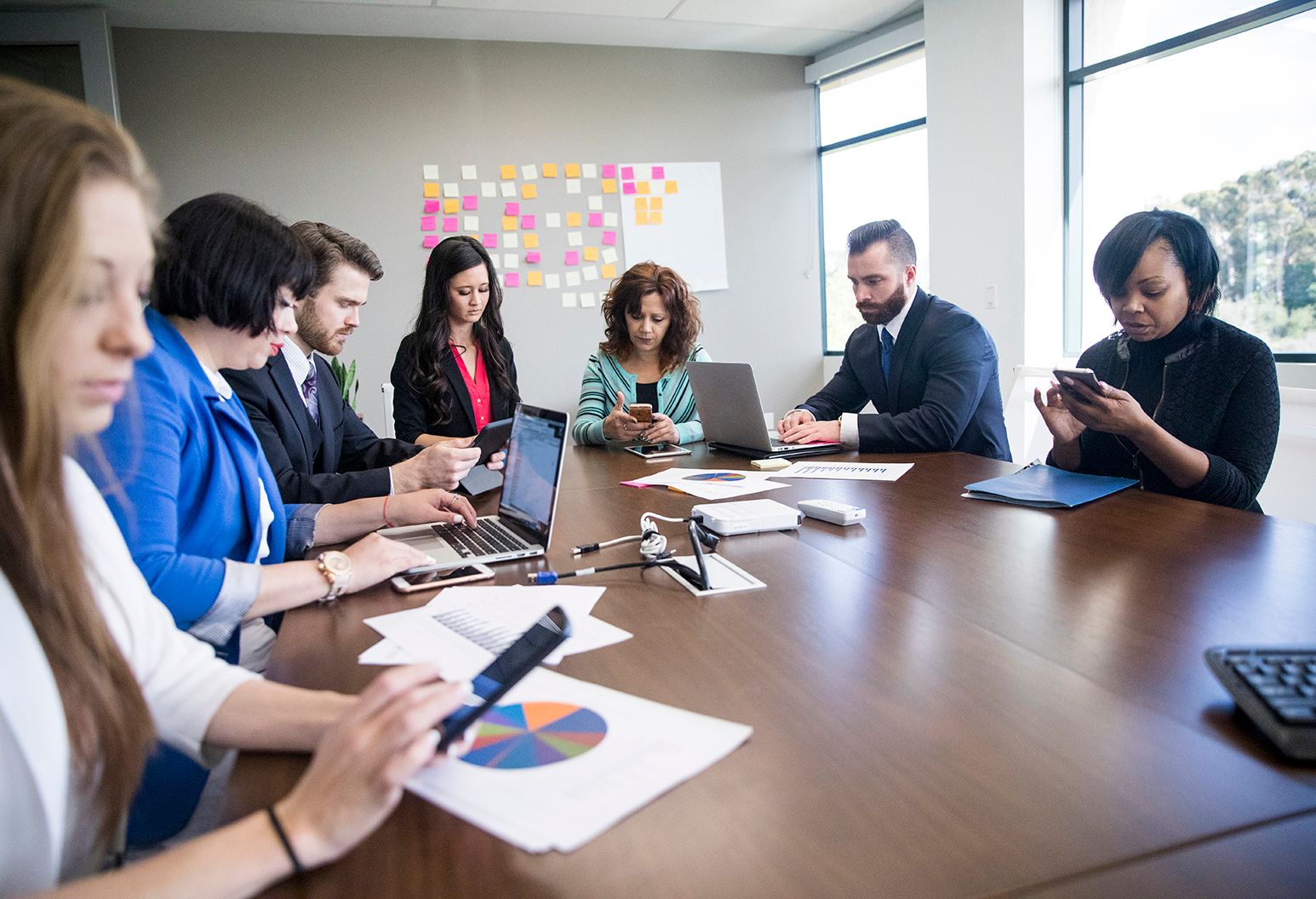brain/nerve health
How To Manage Migraines Without Meds

Surprising ways to block out the interruptions and get things done.
7 min read
Every day, it seems, there are more things to distract us. You can’t enjoy a cup of coffee or a quiet meal without a text message, news headline or pop up ad tugging at your attention. Balancing the barrage of alerts without getting overwhelmed isn’t easy. Good news: Humans have the innate ability to perceive more than one thing at a time and distinguish between random lights or sounds and a life-threatening emergency. But even though the human brain is wired for this, there are limitations to our multitasking prowess. Navigating modern life can feel overwhelming, but is it possible to live among the beeps and pop ups without feeling completely stressed out?
“From the moment we open our eyes, we have way too much information,” says Dr. Jacqueline Gottlieb, a neuroscientist at Columbia University. “Our brains have amazing processing capability, but cannot cope with everything.”
Back in the caveman days, humans developed the ability to see or hear more than one thing at a time so they could detect unexpected danger—like a hungry animal charging toward them while they were sharpening rocks into tools. Now, instead of hungry animals, we have eager sales pitches, entertainment opportunities, and that long-lost friend around the world who just found you on Facebook. That’s all in addition to ordinary, day to day interactions.
Certain distractions are more disruptive than others. A cell phone call or an emotional comment from a colleague is more likely to draw us off course. In one study by the Journal of Experimental Psychology, the mere awareness of receiving a cell phone call was enough to trigger mind-wandering and hinder performance. If awareness of a phone call creates such problems, you might think that putting that cell phone away for a while would help.
Think again.
Many of us have become so attached to our cell phones and the ability to instantly be in touch, that the idea of turning them off creates new problems. In another study, when a group of college students was asked to put their phones away for an hour, their anxiety levels increased—and stayed that way. The constant checking for messages creates a sometimes irrational fear of missing out (FOMO). It also leads people to confuse actual high-priority tasks with whatever message just arrived.
“The concept of FOMO is not new. People have a natural tendency to wonder what is happening and what they might be missing. This need to connect is human,” explains Amy Kirschenblatt, a social worker at Cohen Children’s Medical Center. “But the world is so fast-paced now. The amount of socializing we are able to do in a day, in an hour, thanks to technology, has risen dramatically and we have trouble keeping up. It keeps us in a heightened state and we are not equipped to handle the excess input.”
In fact, we seek out more information even as we become less able to filter out distractions. People these days are “increasingly hungry for something new,” even if they can’t absorb what they already have, according to 2014 Microsoft research.
Employers estimate that lack of focus kills about two hours of productivity each day for most of their workers, who turn to personal messages, news, shopping or gossip when they are supposed to be working, according to a Harris Poll survey last year for CareerBuilder.

Outside of work, lack of focus contributes to everything from family issues to safety risks. The Centers for Disease Control and Prevention attributed 3,477 traffic deaths in 2015 to distracted drivers. That makes up about 10 percent of all traffic fatalities—up 12 percent since 2010. The National Transportation Safety Board found that distraction was a factor in some of the most deadly accidents in recent years, including deadly airplane and train disasters.
There is ample need for people to focus on developing better habits and routines, because evidence suggests we are getting worse at paying attention. The average attention span of an adult is estimated to have dropped from about 12 seconds in 2000 to less than 9 seconds in 2015. Goldfish literally stay focused longer than most of us.
The problem is real, but so are the solutions.
Just ask a person who has attention deficit hyperactivity disorder (ADHD). Seriously. They know what it’s like to deal with distraction. And they have strategies to cope.
To create order out of chaos, we typically use what experts call “executive function,” which is how our brains can take sights, sounds, or other information from multiple sources, distill what’s important, and decide what to do. But our frontal lobes may not have evolved enough quite yet to deal with the influx of information that modern life throws our way. In the meantime, there are tricks that have been developed for people who suffer from ADHD that might just hold the answers the rest of the world so desperately needs right now.
“Pretty much everyone is distractible,” says psychiatrist and author Dr. Edward Hallowell, whose Hallowell Centers in New York, Boston, Seattle and San Francisco specialize in treating ADHD. “The main differences between modern life and true ADHD are the intensity and duration of the distractibility and the extent to which it impairs performance in life,” he says.
Hallowell suggests that people start by focusing on developing healthy habits—having consistent sleep and wake times, eating right, and getting regular physical fitness. Developing these high-priority routines—which requires focus—empowers people to ward off other distractions or stay on-task better.
“The less time you spend on stupid decisions, the more time you can spend on things that matter,” says entrepreneur and author Peter Shankman, whose book Faster Than Normal: Turbocharge Your Focus, Productivity, and Success with the Secrets of the ADHD Brain offers practical advice for setting clear priorities and avoiding known distractions to get things done.
“Most people with ADHD don’t do well with moderation,” he says. For Shankman, an adult living with the disorder, that means finding an environment that helps him shut out distraction. “A library, a café, or a park—find what works for you,” Shankman says. In other words, modify parts of your environment that are within your control so that there are fewer shiny objects catching your eye.
To master anything, you need practice. Learning to focus is no exception.
Begin, he advises, by figuring out what your major distractions are and finding a place where you won’t encounter them. Focus on one thing for 15 minutes, then take a break. Maybe you can do 30 minutes, or an hour. If you set 45 minutes after work to power through that stack of thank you notes you want to write, turn off the cell phone and park yourself in your distraction-free place. When you’re done, celebrate what you’ve accomplished. And do it over again next time you have work to get finished.
“Essentially, if you don't follow your rules, that's when the negatives, the sidetracking, the spacing out, the forgetfulness, come into play. As long as you follow them, you’re golden,” Shankman explains.
Little distractions add up, especially if you are constantly faced with choices. Do you really need more than one type of shampoo in your shower? These little choices add to anxiety or what Shankman calls “decision fatigue.”
You can combat that “fatigue” by limiting your choices. For example, simplify your wardrobe. That’s a go-to move of many successful people like Apple founder Steve Jobs, who was known to stock his closet with identical shirts to automate getting dressed. If you have a dozen different shirts, you might linger at your closet trying to pick an outfit. The idea is to convert sources of distraction into rituals that can be handled almost automatically.
If it sounds like the solution to getting distracted is to avoid distractions, you are right. Problems arise when we allow those things to fill up the space around us. Make a conscious choice to create your own “zone of focus,” Shankman suggests. For him, that means getting onto an airplane for a long flight with a specific project to work on. For others, it might be a library or a room where cell phones and other electronics are turned off. Some companies require employees to shut off email for certain periods. Or, close Facebook for a while.
The bottom line: Pick what you want to focus on, rethink the habits that lead to distraction, and find what works for you.
The Well is Northwell Health’s commitment to the future of health care. In this time of information overabundance, much of which is inaccurate, unhelpful, or even difficult to understand, Northwell Health is on a mission to make a difference as an honest, trusted, and caring partner. The site connects with consumers to provide them with personalized content that reduces their stress, makes them laugh, and ultimately feel more confident and capable on their healthcare journey.